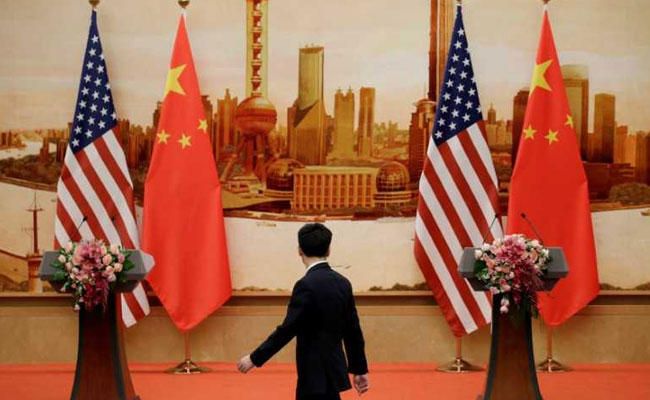Media Report

- The New York Times reports, "The Trump administration added five Chinese entities to a United States blacklist on Friday, further restricting China's access to American technology and stoking already high tensions as President Trump and President Xi Jinping of China prepare to meet in Japan next week. The Commerce Department announced that it would add four Chinese companies and one Chinese institute to an 'entity list,' saying they posed risks to American national security or foreign policy interests. The move essentially bars the entities, which include one of China's leading supercomputer makers, Sugon, and a number of its subsidiaries set up to design microchips, from buying American technology and components without a waiver from the United States government. The move could all but cripple these Chinese businesses, which rely on American chips and other technology to manufacture advanced electronics."
- The Washington Post reports, "Thousands of demonstrators again blocked main city thoroughfares on Friday and, in a new show of displeasure, surrounded police headquarters, demanding that a deeply unpopular extradition bill be fully withdrawn by the city's leader and police investigate cases of alleged police brutality. For over a week, enormous numbers of protesters have taken to the streets of the semiautonomous territory, calling for the scrapping of a bill that would allow for extraditions to mainland China. The continued upheaval has placed Carrie Lam, the pro-Beijing chief executive, at the center of the most serious crisis of her political career. Lam has suspended the bill and offered up two public apologies but has refused to withdraw the legislation completely. Her apologies have been dismissed as self-serving, and many continue to demand that she resign."
- Reuters reports, "U.S. Vice President Mike Pence on Friday called off a planned China speech that had been initially cast as a sequel to a blistering broadside he delivered in October, a move aimed to averting increasing tensions with Beijing, a White House official said. The decision came a week ahead of what could be pivotal talks on the U.S.-China trade war between U.S. President Donald Trump and Chinese President Xi Jinping on the sidelines of a G20 summit in Osaka, Japan. The two nations have slapped tariffs on hundreds of billions of dollars' worth of each other's goods and the meeting is aimed at discussing whether a further escalation in tariffs can be avoided. 'There is room for progress, and even if incremental, we didn't want to step on that potential,' a White House official said, speaking on condition of anonymity about why the speech was called off."
Calendar
- 2019-06-20 Xi Jinping Arrives in North Korea, With Many Eyes on Trump
- 2019-06-19 Senior U.S.-Chinese trade negotiators to confer before Trump-Xi G20 meeting
- 2019-06-18 Trump says U.S., Chinese teams to restart trade talks ahead of G20
- 2019-06-17 Companies in furious bid to prevent new China tariffs as summit looms
- 2019-06-13 China’s Trade Frontman Points, With Laser, to Bright Side of U.S. Tensions
- 2019-06-12 Wall Street Is Lending Billions to China's Hottest Tech Unicorns
- 2019-06-11 China Moves to Close Gap in Trade Expertise as Clash With Trump Intensifies
- 2019-06-10 More than 1 million protest in Hong Kong, organizers say, over Chinese extradition law
- 2019-06-07 Outrage in Hong Kong as Extradition Plan Exposes Deep Fears of China’s Rule
- 2019-06-06 Trump to decide on $300 billion China tariffs after G20 meeting
News
- The Washington Post Hong Kong protesters surround police headquarters, demand extradition bill be truly scrapped
- The New York Times U.S. Blacklists More Chinese Tech Companies Over National Security Concerns
- Reuters Pence puts off China speech sequel ahead of Trump-Xi talks
- The New York Times Friendlier Days for North Korea and China? Maybe Not
- Reuters U.S. bars China supercomputer firms, institute from buying American parts
- The Washington Post Chinese crackdown on foreign names draws protest
- The New York Times Taiwan's iPhone Tycoon Walks a Fraught U.S.-China Line in Presidential Run
- Bloomberg Comey Says Threat From Huawei Is Something He and Trump Agree On
- CNBC Hong Kong protests give Taiwanese president Tsai Ing-wen a boost as elections approach
- Bloomberg Philippines Rejects China's Call to Jointly Probe Sea Collision
- CNN Huawei phones were super hot in Europe. Not anymore
- Reuters Chinese artist Ai Weiwei turns to opera with 'Turandot'
- Bloomberg China Investors Snap Up Hong Kong Shares of Two Homegrown Banks
- Reuters Apple, Keurig Dr Pepper, Dollar Tree, Fitbit press U.S. to drop China tariff plan
Commentary
- Foreign Affairs Xi Jinping's Trade Conundrum
- The Diplomat Hong Kong Protests: How Did We Get Here?
- The Washington Post Hong Kong reminds us of China's fragility
- Bloomberg China Looks for a Savior in the Shadows
- Foreign Policy China's Communist Party Is Making Its Own (Virtual) Reality
- CNN Hong Kong protesters face a powerful enemy
